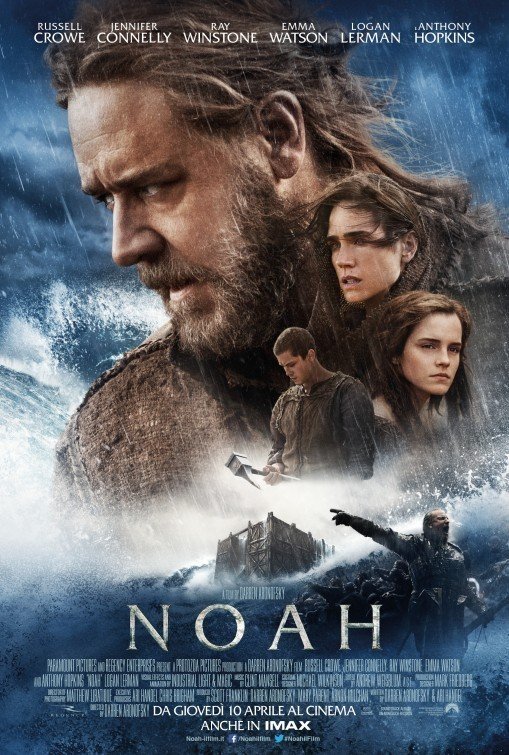“The Ultimate Survival Story”
What You Need To Know:
NOAH is an epic adventure story, with a nice ending that wraps everything up on a hopeful, inspiring note. In the ending, a conflicted Noah learns that the Creator is a God of mercy and love, not only justice. Despite the positive ending, NOAH inserts some extra-biblical material into the story, to build tension and give the story a dramatic three-act structure. The positive ending doesn’t quite justify this. That said, NOAH shows Adam and Eve really existed, the Fall of Man is real, and the Creator acts miraculously. Caution is advised for some violence and intense moments.
Content:
(BB, CC, FR, EE, L, VV, S, N, AA, M) Ultimately, by the movie’s end, a strong biblical, moral worldview with strong redemptive elements extolling justice, mercy, love, and faith plus a couple scenes of forgiveness retelling the biblical story of Noah and the Ark, but movie inserts some extra-biblical story elements to create a three-act structure with more jeopardy, including a subplot about a group of angels who disobey the “Creator” and help Cain’s sinful descendants create “industrialized” cities to despoil the Earth, Noah is more conflicted and falsely interprets the visions God gives him to even consider infanticide, God doesn’t speak directly to Noah but gives Noah visions that Noah must interpret, an environmentalist spin is given to man’s sinfulness and also to the biblical passage of God giving mankind “dominion” over earth’s plants, minerals, and animals, but movie shows Great Flood is global, Adam and Eve really existed, the Fall of Man really occurred, the Earth was created in six days, Cain kills Abel, God miraculously acts time and time again, and the story is interpreted as a story of justice, mercy, salvation, and faith; three or four “d” words uttered by main villain, Tubal-cain, a descendant of Cain; strong action violence includes “fallen” angels encrusted with rock club evil people away from the ark, Noah and his sons have to fight some evil men trying to get on the ark, Cain takes a rock in silhouette and starts to bring it down on Abel but impact not shown, little girl has a bloody wound on her belly, Tubal-cain slays Lamech, flood waters sweep people away, some stabbings, young woman gets her ankle caught by a steel trap, a birthing scene, man bites into lizard, gory image of a killed animal, Noah considers infanticide; no sex but some passionate kissing, and it’s vaguely implied Shem has gone off with his female partner (there’s no formal marriage ceremony in the movie, but the times are primitive, with no formal church) and Shem’s “wife” becomes pregnant; partial upper male nudity; as in the biblical account Noah becomes drunk; no smoking or drugs but Methuselah gives Noah some “tea,” which seems to give Noah another vision; and, lying, Noah considers infanticide of his daughter-in-law’s progeny because he wrongly thinks God doesn’t want mankind to survive the Great Flood’s aftermath, covetousness, family conflict, and evil leader plans on killing Noah and taking his family.
More Detail:
The movie starts with Noah as a young boy being taught the Creation Story by his father, Lamech. Lamech mentions God’s creation of the universe ex nihilo and follows it up with allusions to the Fall of Adam and Eve and Cain murder of Abel. A group of angels called, the Watchers disobey God and help Cain and his descendents industrialize the earth but they have despoiled it. So now the earth has become a barren wasteland, like something out of a MAD MAX movie. For disobeying the Creator, the angels became encrusted with black rock.
Lamech and his son live off the land, but they also have to avoid marauding bands of evil men descended from Cain. Sure enough, three such men, led by a young Tubal-cain, kill Lamech, but Noah escapes.
Years later, Noah is married to Naameh. They have three boys, Shem, Ham, and young Japheth. Noah tells his sons they only use what they need. He gets a vision of the earth being devastated by a giant flood. He decides to consult his grandfather, Methuselah, on what the Creator wants him to do.
Noah takes his family to the mountain where Methuselah lives. Along the way, they find a seriously wounded young girl named Ila, and Noah takes her into the family. Noah’s wife says Ila’s wound will prevent her from having children.
At the mountain, Methuselah gives Noah a seed from the Garden of Eden, and Noah gets a vision that he must build an ark for the animals and his family to survive the flood. Noah plants the seed, which miraculously grows into a massive forest. With help from several of the Watchers, Noah and his sons begin building the ark.
Years pass. When the ark is about halfway built, Tubal-cain suddenly shows up with a small army. He demands to be included in the ark, but Noah says no. The Watchers with Noah prevent Tubal-cain from taking the ark. Tubal-cain vows to return some day with a larger army to defeat the Watchers.
Sure enough, with the floodwaters about to come, Tubal-cain returns. Meanwhile, Shem and Ila have fallen in love, but Ham and Japheth wonder where they will get wives to help re-populate the world. As the rain starts pouring, a final confrontation with Tubal-cain looms. Meanwhile, Ila miraculously becomes pregnant, but Noah decides mankind isn’t fit to live. So, he vows to kill the baby if it’s a girl. Only a miracle can save the day.
NOAH is a spectacular epic with a hopeful, inspiring ending. Although it stumbles along the way, it delivers enough modern spectacle and dramatic conflict to please most moviegoers. Director Darren Arenofsky uses a great deal of metaphor and symbolism to tell the story. The villain, Tubal-cain, is a bit one-dimensional, however, and the movie’s post-apocalyptic vision of the evil world that man has created is a bit derivative of other movies. Also, the invention of the giant angelic “Watchers” encrusted with rock is too reminiscent of the tree Ents in THE LORD OF THE RINGS.
Everything in the movie works toward the hopeful ending, where Noah prayerfully gathers his family for the new beginning after the Great Flood. This ending nicely sets the stage for the covenant God makes with Abraham and his descendants, including the provision God makes for the Hebrew priesthood under Moses.
Although the movie adheres to the basic biblical story of Noah and the Ark, it adds some extra biblical material with changes, twists, and spins, to create a three-act structure and add more jeopardy to the story. Instead of God speaking directly to Noah like in the Bible, the Creator gives visions to Noah that he must interpret. Doing this helps the movie turn Noah into a more conflicted, troubled man. In this way, the movie builds up conflicts between Noah and his family that aren’t in the biblical text. Although this material is extra-biblical, it does give the movie the tension it needs to build more excitement into the final act.
Also, the movie gives an environmentalist spin to the sinfulness of man. It depicts Noah as the first survivalist living off the land. At one point, the movie even seems to undercut Genesis 1:26 in the King James Version of the Bible where God gives man “dominion” over the earth by placing the words in the mouth of the villain. (Many Bible haters and humanist environmentalists like to twist this verse by misinterpreting it to mean that God allows man to pollute and abuse the earth, including the animals.)
Another problem with NOAH is its depiction of the “fallen” group of angels it calls the Watchers. It allows these fallen angels to seek forgiveness from the Creator by helping Noah build and defend the ark. This is not a traditional way of viewing God’s angels. However, to be fair, the movie never shows the Watchers siding with Satan, and Satan doesn’t appear in the movie other than some images of the serpent that tempted Eve. So, it may be argued that the disobedient angelic beings in NOAH are in a different kind of “fallenness” than the angels who sided with Satan.
Finally, the movie never mentions the word God, but only calls God the “Creator.” This may be an attempt to avoid controversy over the name of God, but it doesn’t quite work.
Despite all these problems, NOAH has a lot of positive things going for it. The movie shows that Adam and Eve really existed and that they were in a state of grace before their Temptation and Fall. Young Earth Creationists will be pleased that the movie says God created the earth in six days and seems to be a rather recent creation when Noah appears. The movie also shows that the Great Flood was global. The movie also shows that Cain kills Abel as a result of the Fall. In addition, throughout the movie, the Creator seems to act miraculously time and time again. Finally, the filmmakers interpret the story of Noah as a story of God’s justice and mercy. Thus, in the third act, Noah eventually learns that the Creator is a God of mercy and love as well as justice. It is this revelation that leads to the movie’s hopeful and inspiring ending. That ending includes a spectacular rainbow sent from the Creator. It also includes a nice foreshadowing of some Jewish religious traditions later developed under Moses in Exodus, Leviticus, Numbers, and Deuteronomy.
All in all, therefore, MOVIEGUIDE® advises a light caution for violence, the extra-biblical elements, and some intense moments.


 - Content:
- Content: 





